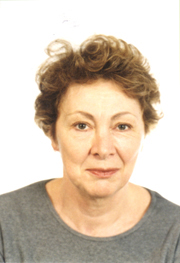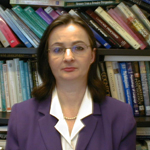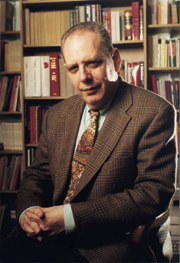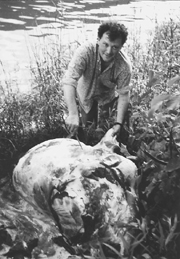
 |

|
|
 |
|
|
|||
|
|
|
|
|
 Chantal Collard, Sociology/Anthropology |
Chantal Collard, Sociology/Anthropology Chantal Collard received her undergraduate education in anthropology at the Sorbonne and her graduate training at the University of Paris X Nanterre. She also spent a year as a Fulbright-Hays student at the University of Pennsylvania. She taught at Université Laval for 11 years before joining Concordia’s Sociology and Anthropology Department in 1984. While at Concordia, she spent a year as Maître de Conférence Associée at L’Ecole Pratique des Hautes Études in Paris. Over the course of her career, Dr. Collard did lengthy fieldwork research in various locales, mainly in Cameroon, Charlevoix (Québec) and Haiti. Her current work is on international adoption from the point of view of sending countries. She has received $234,000 in research grants. In addition to numerous articles in scholarly journals and chapters in books, Dr. Collard has written a book, edited or co-edited three books on the topic of kinship and social organization, and presented her work at many national and international conferences. She also served on several editorial boards, most notably and for many years Anthropologie et Sociétés, as well as the adjudication committee to the Aid to Scholarly Publication Program at the Social Science Federation of Canada. Dr Collard’s service dossier is impressive. She has been Concordia representative to the Commission d’évaluation des projets et programmes at CREPUQ and, as such, she played a key role in the successful launching of the MA program in Anthropology at Concordia. Among her other contributions are president of the Canadian Anthropology Association (CASCA), and member of the board of directors at the Social Science Federation of Canada. |
||
 David Howes, Sociology/Anthropology |
David Howes, Sociology/Anthropology A native of Montreal, David Howes holds a BA from the University of Toronto (1979), an MLitt from Oxford University (1981) and a PhD from the Université de Montreal (1992)—all in anthropology—as well as two degrees in law from McGill (1985). He started at Concordia as a part-time faculty member in 1983, became an assistant professor in 1986, and was promoted to associate professor in 1994. He recently completed four years as chair of the Department of Sociology and Anthropology. Dr. Howes’ anthropological research has taken him to Papua New Guinea, north-western Argentina and the south-western United States. His work has attracted close to $400,000 in research funding from both governmental and corporate sources. His research interests cover a broad spectrum, from cross-cultural variations in sensory perception to the globalization of the consumer society, and from Canadian constitutional law and popular culture to the intellectual property rights of indigenous peoples. David Howes is the editor of The Varieties of Sensory Experience (1991) and Cross-Cultural Consumption (1996), and the author of 47 journal articles and book chapters. He is the co-author (with Constance Classen and Anthony Synnott) of the award-winning book Aroma: The Cultural History of Smell (1994), now translated into Portuguese, Japanese and Greek. He was also one of the organizers of the highly successful Uncommon Senses conference, which attracted some 330 scholars to Concordia last April to discuss the senses in art and culture. In the last three years, he has presented guest lectures at Harvard, Princeton, the Warburg Institute and the University of Amsterdam, among other institutions, and has been interviewed numerous times by local and national media. David Howes is a highly regarded teacher. He has directed the theses of three doctoral and five Master’s students and is currently directing the research of 11 students in the PhD Humanities and Anthropology magisteriate programs. |
||
 Diane Poulin-Dubois, Psychology |
Diane Poulin-Dubois, Psychology Diane Poulin-Dubois received her PhD from Université de Montréal in 1983 and completed postdoctoral training at McGill and Harvard University. In 1987, she was awarded a SSHRC University Research Fellowship and joined Concordia University as assistant professor. At that time, she also joined the Centre for Research in Human Development and is currently associate director. She was promoted to associate professor in 1991. Throughout her career, Dr. Poulin-Dubois has been a visiting fellow at Cornell, Oxford, and Paris V universities, and in 2001, was awarded a visiting professor fellowship from the government of France. Professor Poulin-Dubois’s expertise is in cognitive and language development. In particular, she is internationally known for her theoretical and empirical contributions to the understanding of conceptual knowledge in infancy. Her research, funded through NSERC, SSHRC and FCAR, concerns the early acquisition of a theory of mind, conceptual categories, and gender concepts and stereotypes. She is the author of some 40 publications, in addition to many others in refereed conference proceedings. Dr. Poulin-Dubois has been invited to give 30 talks in psychology departments in Europe and North America. She is presently on the editorial board of the journal Enfance and has sat on FCAR and NSERC Grant Selection Committees, as well as on numerous FCAR Fellowship Selection committees. She has also been a member of the steering committees of two international conferences held in Montreal. Dr Poulin-Dubois has trained several graduate students and two postdoctoral fellows. As well, she has supervised over 20 undergraduate research theses. Currently, she is supervising three PhD, and two Master’s students. She has made many contributions in service. For example, she has served as graduate program director (MA) of the Department of Psychology and on a number of department committees. Outside the department, she has served on the University Appeals Board, the Arts and Science Committee on the Status of Women, and the Arts and Science GRF Grant Selection Committee. |
||
 Richard Schmid, Education Photo by Christian Fleury |
Richard Schmid, Education Richard Schmid has been chair of the Department of Education since 1994. He holds a BA from St. John’s University in psychology and German (1973), and from Arizona State Unversity, an MA (1975) and a PhD (1977) in educational psychology. He came to Concordia in1978 as an assistant professor in Educational Technology, and became an associate professor in 1981. His research has dealt with the application of technologies to improve pedagogy and training in the workplace and schools, especially as applied to computer-supported collaborative learning and performance. This has included the analysis of learning strategies and computer-mediated conferencing in in-class and distance education contexts. He has written many refereed publications. In 1999, with R.F. Beihler, J. Snowman and M. D’Amico, he published the textbook Psychology Applied to Teaching – Canadian Edition (ITP Nelson Canada) Dr. Schmid has also received, with colleagues, significant grants, including a recent award for a study on a literacy program, part of a project that received a grant worth nearly $6 million US in total. His current grants also include awards from SSHRC ($205,192), the Canadian Foundation for Innovation ($483,558) and the J.W. McConnell Family Foundation ($1.250 million). |
||
 Martin Singer, History |
Martin Singer, History Martin Singer is the Dean of Concordia University’s Faculty of Arts and Science, the largest of Concordia’s four Faculties, with 27 academic units, 1,000 full and part-time professors, 12,000 undergraduate program students and a nearly $50-million operating budget. Dr. Singer joined the faculty of Sir George Williams University in 1972 as a professor of history after graduating from the University of Michigan with an MA in East Asian Studies and a PhD in History. His specialty is Chinese history and he is regarded as one of North America’s leading Sinologists. During his career at Concordia, Dr. Singer has offered survey courses in the History of China, the History of Japan and the History of East Asia, as well as intermediate and advanced courses on Traditional China, Modern China and Imperialism and Revolution in China. His popular History of China course was one of the first in the Faculty of Arts and Science to feature a Web component that enabled students to review videotaped class lectures over the Internet. At the graduate level, Dr. Singer has supervised several MA and PhD candidates. Outside of the classroom, Dr. Singer has left an indelible mark on Concordia through the various administrative tasks he has taken on. As assistant provost from 1977 to 1980, he played a leading role in the creation of seven Arts and Science colleges, including the Liberal Arts College, Science College, the Simone de Beauvoir Institute and what is now the Institute for Co-operative Education. He also served as Provost of the Faculty of Arts and Science from 1980 to 1985, Director of the Council for International Cooperation from 1986 to 1989 and as Chair of the Department of History from 1994 to 1997. As dean since 1997, Dr. Singer has overseen the rebuilding of the Faculty’s professorial ranks (105 new tenure-track professors hired to date) and has been a leader behind the effort to build a science complex on our Loyola Campus. He has also played an integral role in incorporating technology in the Faculty and has worked hard to internationalize the Faculty through stepped-up student and faculty recruitment efforts and increased opportunities for student exchanges. |
||
Barbara Woodside, Psychology Barbara Woodside came to Concordia University in 1980 as an assistant professor of psychology, having received her undergraduate degree from University College London, England, and her graduate training at McMaster University. Since coming to Concordia, Dr. Woodside has established a research program that is funded by grants from CIHR, NSERC and FCAR . The major goal of her research program is to use a rat model to explore the complex interaction of neural, endocrine and behavioural processes that enable female mammals to successfully meet the challenge of pregnancy and lactation. A specific focus of this research is to investigate the mechanisms through which food availability affects the suppression of ovulation during lactation. Dr. Woodside has been a member of the Centre for Studies in Behavioural Neurobiology since 1995. She is a member of the advisory board of the Society for Behavioral Neuroendocrinology and on the editorial board of the journal Hormones and Behavior. She has been a member of the Behavioral Sciences “A” grant review committee of CIHR since 1998. Dr. Woodside’s teaching contributions have included supervising student theses at the undergraduate, masters and doctoral levels. She has also taught a wide variety of undergraduate courses including the introductory course in Behavioral Neurobiology. Her service to the university community includes membership on many committees at the department, Faculty and university level. |
|||
 Dominique Legros, Sociology/ Anthropology |
Dominique Legros, Sociology/ Anthropology |
||